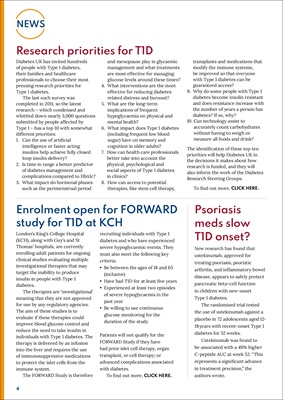
4
NEWS
Research priorities for T1D
Diabetes UK has invited hundreds
of people with Type 1 diabetes,
their families and healthcare
professionals to choose their most
pressing research priorities for
Type 1 diabetes.
The last such survey was
completed in 2011, so the latest
research - which condensed and
whittled down nearly 3,000 questions
submitted by people affected by
Type 1 - has a top 10 with somewhat
different priorities:
1. Can the use of artificial
intelligence or faster acting
insulins help achieve fully closed
loop insulin delivery?
2. Is time in range a better predictor
of diabetes management and
complications compared to HbA1c?
3. What impact do hormonal phases
such as the perimenstrual period
and menopause play in glycaemic
management and what treatments
are most effective for managing
glucose levels around these times?
4. What interventions are the most
effective for reducing diabetes
related distress and burnout?
5. What are the long-term
implications of frequent
hypoglycaemia on physical and
mental health?
6. What impact does Type 1 diabetes
(including frequent low blood
sugar) have on memory and
cognition in older adults?
7. How can health care professionals
better take into account the
physical, psychological and
social aspects of Type 1 diabetes
in clinics?
8. How can access to potential
therapies, like stem cell therapy,
transplants and medications that
modify the immune systems,
be improved so that everyone
with Type 1 diabetes can be
guaranteed access?
9. Why do some people with Type 1
diabetes become insulin resistant
and does resistance increase with
the number of years a person has
diabetes? If so, why?
10. Can technology assist to
accurately count carbohydrates
without having to weigh or
measure all foods and drink?
The identification of these top ten
priorities will help Diabetes UK in
the decisions it makes about how
research is funded, and they will
also inform the work of the Diabetes
Research Steering Groups.
To find out more, CLICK HERE.
Enrolment open for FORWARD
study for T1D at KCH
London's King's College Hospital
(KCH), along with Guy's and St
Thomas' hospitals, are currently
enrolling adult patients for ongoing
clinical studies evaluating multiple
investigational therapies that may
target the inability to produce
insulin in people with Type 1
diabetes.
The therapies are 'investigational'
meaning that they are not approved
for use by any regulatory agencies.
The aim of these studies is to
evaluate if these therapies could
improve blood glucose control and
reduce the need to take insulin in
individuals with Type 1 diabetes. The
therapy is delivered by an infusion
into the liver and requires the use
of immunosuppressive medications
to protect the islet cells from the
immune system.
The FORWARD Study is therefore
recruiting individuals with Type 1
diabetes and who have experienced
severe hypoglycaemic events. They
must also meet the following key
criteria:
• Be between the ages of 18 and 65
(inclusive)
• Have had T1D for at least five years
• Experienced at least two episodes
of severe hypoglycaemia in the
past year
• Be willing to use continuous
glucose monitoring for the
duration of the study
Patients will not qualify for the
FORWARD Study if they have
had prior islet cell therapy, organ
transplant, or cell therapy; or
advanced complications associated
with diabetes.
To find out more, CLICK HERE.
Psoriasis
meds slow
T1D onset?
New research has found that
ustekinumab, approved for
treating psoriasis, psoriatic
arthritis, and inflammatory bowel
disease, appears to safely protect
pancreatic beta-cell function
in children with new-onset
Type 1 diabetes.
The randomised trial tested
the use of ustekinumab against a
placebo in 72 adolescents aged 1218
years with recent-onset Type 1
diabetes for 52 weeks.
Ustekinumab was found to
be associated with a 49% higher
C-peptide AUC at week 52. "This
represents a significant advance
in treatment precision," the
authors wrote.